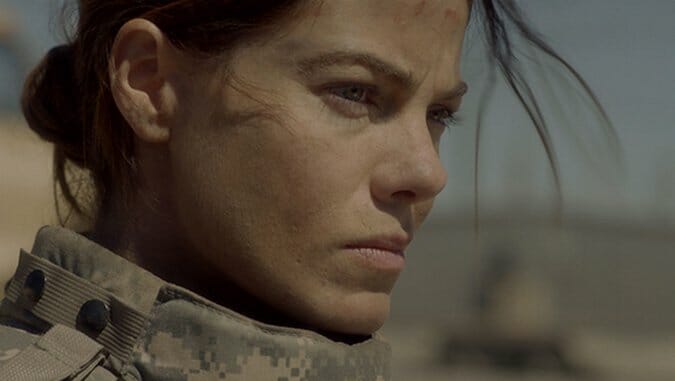Fort Bliss

Michelle Monaghan, who’s played second fiddle in such projects as Gone Baby Gone and True Detective, gets the chance to steer her own star-making vehicle with Fort Bliss—and her performance is nothing short of masterful. The film is pretty much the perfect opportunity too, as it’s one hell of a character study: Monaghan plays a U.S. Army medic finally home from war, riddled with all the complications and adjustments that transition necessitates. Comparisons to The Hurt Locker abound, though they aren’t inappropriate: take that film’s sentiment and shift the gender POV, moving the action predominantly state-side, and you’ve got a picture that would make Kathryn Bigelow proud.
In the Middle East, Monaghan’s Maggie Swann is a can-do staff sergeant riding around in Humvees, pulling shrapnel from wounded soldiers and firing back in dogfights. Back home, she’s got custody of her five-year-old son Paul (Oakes Fegley), but she hasn’t seen him in over a year and a half, during which he’s become attached to Alma (Emmanuelle Chirqui), his father’s new girlfriend. The film isn’t shy about drawing a very stark debate: which is the true Hell, war or, in the case of Swann’s divorce from Paul’s father, marriage?
Through tantrums and withdrawal, Paul lets his mother know he’s none too pleased with his current situation back in Maggie’s care, constantly comparing her maternal losses to Alma’s wins. Then, with discharge imminent, though protocol has her regularly checking in at the titular base (a real base in Texas), Maggie does the unthinkable and re-enlists. It’s a hard sell given her situation, but then again, like Jeremy Renner’s bomb tech in Hurt Locker, dislocation from society is understandable. Couple that with her inability to connect to her son, and it becomes obvious that her drive to feel effective and needed will inevitably lead her back to the front.
-

-

-

-

-

-

-

-

-

-

-

-

-

-

-

-

-

-

-

-

-

-

-

-

-

-

-

-

-

-

-

-

-

-

-

-

-

-

-

-








































